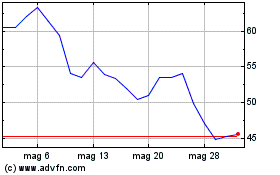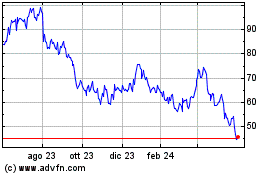Modeling data show Cologuard PlusTM test
delivers highest life-years gained with fewest number of
colonoscopies among noninvasive colorectal cancer (CRC) screening
strategies
Additional abstracts support real-world
expertise and experience in increasing patient adherence,
especially in underserved populations
Exact Sciences Corp. (NASDAQ: EXAS), a leading provider of
cancer screening and diagnostic tests, today announced the company
will present modeling data evaluating the simulated benefit and
burden of established CRC screening strategies, including the
Cologuard Plus™ test during the American College of
Gastroenterology (ACG) Annual Meeting. ACG takes place October
25-30, 2024, in Philadelphia, Pennsylvania. Exact Sciences will
also present new data on improving adherence to help close the gap
in CRC screening. ACG abstracts are available on the meeting
website.
“Exact Sciences is pleased to share new modeling data which
demonstrates the Cologuard Plus test as an efficient CRC screening
strategy across modeled age ranges and screening intervals, given
its high sensitivity and specificity for both cancer and
precancer,” said Paul Limburg, MD, MPH, AGAF, chief medical officer
for Screening, Exact Sciences. “The data demonstrate our commitment
to continuous improvement and innovation to deliver best in class,
patient-centric cancer screening and diagnostic solutions.”
Researchers used a validated simulation model to assess the
benefit to burden ratio of the Cologuard Plus test and other
established and emerging CRC screening options. Benefit was defined
as life-years gained and burden as the lifetime number of
colonoscopies.
The efficient frontier abstract summary and presentation details
are as follows:
- Next Generation mt-sDNA Has the Best Balance Between Benefit
and Burden of Age- and Interval-Recommended CRC Screening Among
Stool- and Blood-Based Tests (P2119)
- Summary: The next-generation mt-sDNA (ng-mt-sDNA) test
was the only efficient non-invasive modality for screening over the
guideline-recommended age interval of 45-75 years; Blood-based
screening strategies were not efficient or near-efficient at any
screening interval or age-range.
- Session: Monday, October 28, 2024, 10:30 AM – 4:00 PM
EDT
Increasing real-world adherence
The seven remaining abstracts share patient-centric research on
improving CRC screening adherence rates, particularly in
underserved populations. With industry-leading patient navigation
and personalized outreach, these strategies directly impact
millions of lives. When modeled against the U.S. general screening
population, widespread implementation of the reported strategies
could drive as much as a 10% reduction in the CRC screening
gap.*
The abstracts at ACG are as follows:
- Cross Sectional Adherence with the Multi Target Stool DNA
Test for Colorectal Cancer Screening Among Four Largest Payors in
the Country (P0437)
- Summary: This study demonstrates high adherence rates to
mt-sDNA testing across a large, national sample of insured
individuals between ages 45-85 years, with an overall
cross-sectional adherence of 71.2% and an average return time of
27.3 days.
- Session: Sunday, October 27, 2024, 3:30 PM – 7:00 PM
EDT
- Real-World Multi-Target Stool DNA Longitudinal Adherence for
Colorectal Cancer Re-screening in a Large, National
Spanish-Speaking Population (P3827)
- Summary: The overall adherence rate in this population
was 76.7%, with a mean time to test return of 20.2 days;
Personalized patient navigation outreach with Spanish language
support resulted in adherence rates exceeding 70% for CRC
re-screening, across all analyzed age subgroups.
- Session: Monday, October 28, 2024, 10:30 AM – 4:00 PM
EDT
- Gap Closure Adherence to Multi-Targeted Stool DNA Test for
Colorectal Cancer Screening in an Insured Cohort (P0436)
- Summary: The gap closure program achieved nearly 50%
adherence, with an average of 25.5 days to return the kit; This
supports mt-sDNA as an effective modality to enhance CRC screening
participation.
- Session: Sunday October 27, 2024, 3:30 PM – 7:00 PM
EDT
- Impact of Personalized Patient Outreach on Multi-Target
Stool DNA Test Adherence in a Large Colorectal Cancer Screening
Population (P2120)
- Summary: Personalized patient outreach significantly
improved mt-sDNA adherence for CRC screening compared to standard
outreach, 63% vs 61.1% respectively.
- Session: Tuesday, October 29, 2024, 10:30 AM – 4:00 PM
EDT
- Impact of Spanish Language Outreach on Multi-Target Stool
DNA Test Adherence in a Spanish-Speaking Population in a Federally
Qualified Health Center (P3825)
- Summary: Preference-based multichannel navigation with
Spanish language outreach significantly improved patient adherence
to CRC screening in the FQHC Spanish-speaking population,
increasing adherence from 45.10% to 51.60%.
- Session: Monday, October 28, 2024, 10:30 AM – 4:00 PM
EDT
- Impact of Preference-Based Digital Navigation on
Multi-Target Stool DNA Test Adherence in a Large Colorectal Cancer
Screening Population (P2118)
- Summary: Overall mt-sDNA adherence was 63.7% and
analysis by communication type revealed that mt-sDNA significantly
improved adherence: SMS + email (66.5%), SMS (62.9%), email
(64.2%), no digital (57.4%). Additionally, SMS + email demonstrated
the shortest average return time (20.1 days).
- Session: Monday, October 28, 2024, 10:30 AM – 4:00 PM
EDT
- Impact of Spanish Language Patient Navigation on
Multi-Target Stool DNA Test Adherence Among Spanish-Speaking
Patient Population (P3826)
- Summary: Personalized Spanish-language outreach in a
predominantly Spanish-speaking Hispanic patient population
significantly improved mt-sDNA adherence rates; The Spanish
language outreach group exhibited higher mt-sDNA adherence than
English language outreach group (62.0% vs. 57.3%), while also
exhibiting increased odds of mt-sDNA adherence.
- Session: Tuesday, October 29, 2024, 10:30 AM – 4:00 PM
EDT
Meet Exact Sciences Booth Event
Exact Sciences will host two information sessions at the
company’s booth (#839), These sessions will be led by Burak Ozbay,
PhD, MBA, BPharm, Vice President of Health Economics and Outcomes
Research. The sessions will focus on precancer detection and what
modeling can inform about CRC screening tests. The booth sessions
will take place Sunday, October 27 and Monday, October 28 at 5:30
pm and 10:45 am EDT.
*Estimates based on modeling abstract performance against U.S.
based population cohorts of: # of Medicare Advantage members, U.S.
Hispanics and unscreened U.S. citizens.
About the BLUE-C Study
BLUE-C was a multi-center, prospective study (NCT04144738) of
more than 20,000 adults 40 years of age and older. The trial was
designed to evaluate the performance of next-generation Cologuard
(multi-target stool DNA or mt-sDNA). Using colonoscopy as a
reference method, the robust study design compared next-generation
Cologuard and a fecal immunochemical test (FIT). Blood samples were
also collected for later evaluation of a blood-based screening test
being developed by Exact Sciences. BLUE-C is one of the largest
colorectal cancer screening trials ever conducted, and the study
population reflects the racial and ethnic makeup of the United
States according to the 2020 census.
About the Cologuard Plus™ test
Developed in collaboration with Mayo Clinic, the Cologuard Plus
test features novel biomarkers and improved laboratory processes.
It also incorporates enhanced sample stability components to
provide patients more time to return their sample to Exact
Sciences' lab and increase the valid result rate. Exact Sciences
expects to launch the test with Medicare coverage and guideline
inclusion in 2025.
About the Cologuard® Test
The Cologuard test is a first-line colorectal cancer screening
test for use in adults age 45 or older who are at average risk for
the disease. It is included in national colorectal cancer screening
guidelines by the American Cancer Society (2018) and the U.S.
Preventive Services Task Force (2021).
The Cologuard test revolutionized colorectal cancer screening by
providing a best-in-class, noninvasive testing option for those at
average risk. The test looks for certain DNA markers and blood in
the stool that are associated with colorectal cancer and precancer
and was shown to effectively detect colorectal cancer and precancer
in the pivotal phase 3 DeeP-C study. The Cologuard test is easy to
use. It can be completed at home and does not require any time off
or special preparation. In the initial 10 years since launch, the
Cologuard test was used more than 16 million times.
Important Information About the Cologuard Test
Do not use the Cologuard test if you have had precancer, have
inflammatory bowel disease and certain hereditary syndromes, or
have a personal or family history of colorectal cancer. The
Cologuard test is not a replacement for colonoscopy in high-risk
patients. The Cologuard test performance in adults ages 45-49 is
estimated based on a large clinical study of patients 50 and older.
The Cologuard test performance in repeat testing has not been
evaluated.
The Cologuard test result should be interpreted with caution. A
positive test result does not confirm the presence of cancer.
Patients with a positive test result should be referred for
colonoscopy. A negative test result does not confirm the absence of
cancer. Patients with a negative test result should discuss with
their doctor when they need to be tested again. Medicare and most
major insurers cover the Cologuard test. For more information about
the Cologuard test, visit Cologuard.com. Rx only.
About Exact Sciences Corp.
A leading provider of cancer screening and diagnostic tests,
Exact Sciences gives patients and health care professionals the
clarity needed to take life-changing action earlier. Building on
the success of the Cologuard® and Oncotype® tests, Exact Sciences
is investing in its pipeline to develop innovative solutions for
use before, during, and after a cancer diagnosis. For more
information, visit ExactSciences.com, follow Exact Sciences on X
(formerly known as Twitter) @ExactSciences, or find Exact Sciences
on LinkedIn and Facebook.
NOTE: Exact Sciences, Cologuard and Cologuard Plus are
trademarks or registered trademarks of Exact Sciences Corporation.
Oncotype, Oncotype DX, Oncotype DX Breast Recurrence Score, RSClin,
and Recurrence Score are trademarks or registered trademarks of
Genomic Health, Inc. All other trademarks and service marks are the
property of their respective owners. Cologuard is not available
outside of the U.S.
Forward-Looking Statements
This news release contains forward-looking statements concerning
our expectations, anticipations, intentions, beliefs, or strategies
regarding the future. These forward-looking statements are based on
assumptions that we have made as of the date hereof and are subject
to known and unknown risks and uncertainties that could cause
actual results, conditions and events to differ materially from
those anticipated.
Therefore, you should not place undue reliance on
forward-looking statements. Examples of forward-looking statements
include, among others, statements regarding our expectations for
the commercialization of the Cologuard Plus test and the
performance of the Cologuard Plus test in a commercial setting.
Risks and uncertainties that may affect our forward-looking
statements are described in the Risk Factors sections of our most
recent Annual Report on Form 10-K and any subsequent Quarterly
Reports on Form 10-Q, and in our other reports filed with the
Securities and Exchange Commission. We undertake no obligation to
publicly update any forward-looking statement, whether written or
oral, that may be made from time to time, whether as a result of
new information, future developments or otherwise.
View source
version on businesswire.com: https://www.businesswire.com/news/home/20241027869598/en/
Media: Lindsey Dickinson +1 608-690-0383
lidickinson@exactsciences.com
Investor: Erik Holznecht +1 608-800-6605
investorrelations@exactsciences.com
Grafico Azioni EXACT Sciences (NASDAQ:EXAS)
Storico
Da Gen 2025 a Feb 2025

Grafico Azioni EXACT Sciences (NASDAQ:EXAS)
Storico
Da Feb 2024 a Feb 2025
